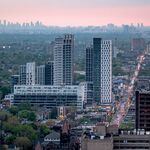denfromoakvillemilton
Senior Member
Member Bio
- Joined
- Apr 30, 2008
- Messages
- 7,453
- Reaction score
- 1,516
- Location
- Downtown Toronto, Ontario
http://www.theglobeandmail.com/news...-politicians-to-address-issue/article1957897/
............................Commute times in Canadian cities are no longer just a source of rush-hour irritation, but a national liability affecting the economic performance of our urban centres and requiring immediate intervention from Ottawa.





